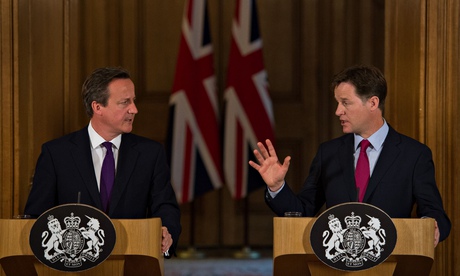
Who wants to be on the side of "criminals, terrorists and paedophiles"? David Cameron and Nick Clegg did not pose the question in quite those terms this morning as they explained new emergency surveillance powers the government is seeking but they came close enough. They wanted to make clear that a statutory boost to the security services, enabling the trawl through records of private internet and mobile phone traffic, was a measure thrust upon them by terrible circumstance.
A European court of justice ruling had challenged the legality of existing practice. Meanwhile, the sinister networks of jihadis and Jimmy Saviles would not wait around while Westminster fretted over the finer points of civil liberties. The time for action is now. Debate, the prime minister said, was for the future.
This is what governments always say when empowering security services, and with some justification. Cameron and Clegg (and their predecessors) see the briefing notes and have the bone-chilling chats with the spooks who persuade them something must be done sharpish. They also have to face the prospect of standing in front of TV cameras explaining in the aftermath of some atrocity why it is that preventative measures that might have averted catastrophe were never taken. "Because the proposed law had a vague whiff of 1984 about it" would not be a very satisfactory response.
Balanced against that calculation is the need to look proportionate – to avoid the impression of constitutional vandalism and frenzied authoritarianism that built up as the last government heaped up ever more draconian anti-terror laws. Both Cameron and Clegg were critical of that tendency when in opposition; for many Liberal Democrats resistance to indiscriminate state snooping is a matter of existential honour. So there are conspicuous safeguards in the proposed new law. There will be a new Privacy and Civil Liberties Board – roughly modelled on a US equivalent – that will, in theory, monitor the balance between security and freedom as advances in technology create ever-expanding opportunities for intrusion. There will also be an independent review of Ripa (Regulation of Investigatory Powers Act), the law passed in 2000 that currently covers electronic and digital surveillance.
Of course, the review could end up creating new powers and enabling deeper data mining but the Lib Dems – and Labour – are rather keen that it be seen as an opportunity to check creeping spookocracy. The shadow home secretary, Yvette Cooper, pointed out in parliament earlier today that a Ripa review was precisely what she had been calling for already.
So Labour has decided to support the government position, claiming to be satisfied by the argument that urgent legislation is required and satisfied with the safeguards to protect civil liberties. The opposition would like to take some credit for making sure those protections are there at all – there was some cross-party consultation behind the scenes before this morning's announcement – but Ed Miliband will have to compete with Clegg for those bragging rights. Not that they'll be worth much in any case. This is one of those arguments that polarises pretty quickly between, at one extreme, those who presume extension of government power over private communication is always sinister and, at the other end of the spectrum, those who see objections to new security measures as naive and verging on treason.
Labour will have been acutely aware of the risks of opposing the government's action when the recurrent charge levelled against Miliband by his enemies is weakness, vacillation and unreadiness for government. It appears that a deal was thus easily struck. Cameron and Clegg offered Miliband some credit for being involved in the process, "securing safeguards" and playing a noble part in protecting national security. In exchange, Downing Street got smooth passage of the bill. A question Labour's more liberal wing will be asking is how active Miliband's participation really was; at what point in the proceedings was he invited into the room? There is, after all, a difference between accepting concessions offered and shaping legislation to one's own agenda.
Ultimately, without seeing the letter of the new law it is hard to come to a dispassionate analysis of how effectively the balance between security and freedom has been struck. What is certain is that a political calculation will have been made at the heads of all three main parties that the potential disapproval of civil libertarians is easily a price worth paying if the alternative is being depicted as a friend to terrorists and paedophiles.

